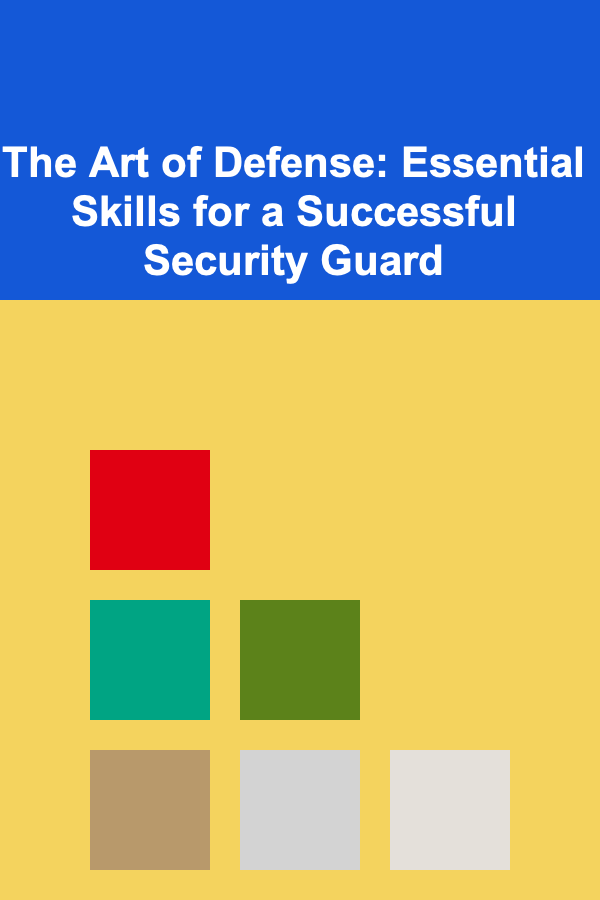
The Art of Defense: Essential Skills for a Successful Security Guard
ebook include PDF & Audio bundle (Micro Guide)
$12.99$7.99
Limited Time Offer! Order within the next:

Security guards play a crucial role in ensuring the safety and protection of people, property, and assets. They are the first line of defense against potential threats, acting as both deterrents and responders to incidents. A successful security guard must possess a unique blend of technical knowledge, situational awareness, communication skills, and physical readiness. This actionable guide explores the essential skills that form the foundation of an effective security guard, highlighting the expertise required to excel in the profession.
Situational Awareness
Situational awareness is one of the most important skills for a security guard. It refers to the ability to perceive, interpret, and understand the environment around you. This skill enables security guards to identify potential threats, assess risks, and take the appropriate action to mitigate danger before it escalates. Developing situational awareness involves constant observation and the ability to react quickly in high-pressure situations.
Key Components of Situational Awareness:
- Observation: The ability to pay attention to details is vital. Security guards need to notice subtle changes in their environment, such as an unfamiliar person loitering in a restricted area or a door that's been left open.
- Pattern Recognition: Over time, successful security guards develop an intuitive sense of what's normal and what's out of place. Recognizing patterns of behavior or environmental changes helps in spotting potential threats early.
- Monitoring Multiple Sources: A security guard must manage various inputs simultaneously, such as surveillance cameras, alarms, and direct observations. Prioritizing and processing this information effectively ensures that no threat is overlooked.
- Mental Discipline: Maintaining focus for long hours without becoming distracted is a challenge. Successful security guards train their minds to stay alert even during monotonous or routine periods.
How to Improve Situational Awareness:
- Practice Mindfulness: Engage in exercises that enhance your ability to focus on the present moment and filter out distractions.
- Engage in Regular Drills: Simulate real-life scenarios that require rapid observation and decision-making. This helps in training the brain to recognize threats faster.
- Stay Physically and Mentally Fit: A healthy body supports mental sharpness. Regular physical exercise can help increase stamina, improve reaction times, and sustain high levels of alertness.
Conflict Resolution and De-escalation
A core function of a security guard is managing situations that could escalate into conflict or violence. Effective conflict resolution is the ability to defuse tense situations before they turn hostile. Security guards are often faced with angry individuals, crowds, or situations that involve confrontations. The ability to stay calm, empathetic, and professional can prevent an issue from turning into a crisis.
Key Principles of Conflict Resolution:
- Calm Demeanor: Remaining calm and composed under pressure is essential. A security guard who maintains a level head helps to diffuse tension and can avoid aggravating the situation.
- Active Listening: Show the individual that you are genuinely listening to their concerns. This creates a sense of validation, which can prevent the escalation of conflict.
- Empathy: Understand the underlying emotions and motivations behind the behavior. When people feel understood, they are more likely to cooperate.
- Clear Communication: Use simple, direct language to explain what is happening and what needs to be done. Clear communication ensures that there are no misunderstandings.
- Non-Threatening Body Language: Avoid aggressive stances, facial expressions, or gestures. Non-confrontational body language can prevent escalation and show the individual that you are not a threat.
How to Develop Conflict Resolution Skills:
- Role-playing Scenarios: Practice handling difficult situations with fellow security personnel or trainers. Simulating conflicts can help develop the necessary skills to handle real-life encounters.
- Stress Management Techniques: Learn how to manage your emotions through techniques like deep breathing, meditation, or mindfulness.
- Study Psychology: A basic understanding of human behavior and the psychology of conflict can offer valuable insights into de-escalation strategies.
Communication Skills
Effective communication is essential for a security guard. Whether interacting with the public, law enforcement, or fellow security personnel, the ability to convey information clearly and professionally is a key aspect of the job. Communication isn't just about speaking; it also involves active listening and understanding non-verbal cues.
Types of Communication Skills for Security Guards:
- Verbal Communication: A security guard must be able to communicate instructions, warnings, or requests to others clearly and effectively. This includes addressing potentially dangerous situations or informing authorities about a security breach.
- Written Communication: Security guards must document incidents, log their daily activities, and fill out reports. Clear, concise, and accurate writing is critical for maintaining reliable records.
- Non-verbal Communication: Body language, eye contact, posture, and facial expressions all contribute to the way a security guard communicates. Non-verbal cues can often convey more than words.
- Radio/Telephone Communication: A security guard frequently uses radios, phones, or intercoms to communicate with other team members or law enforcement. Being able to operate these devices and communicate succinctly is essential.
How to Enhance Communication Skills:
- Participate in Public Speaking: Being comfortable speaking in front of others helps develop clarity and confidence when addressing groups or individuals in stressful situations.
- Engage in Active Listening: Practice listening fully to what others are saying, without interrupting, in order to understand their concerns more deeply.
- Take Communication Workshops: Workshops that focus on effective verbal and written communication can help sharpen your skills and improve your effectiveness on the job.
Physical Fitness and Self-defense
While security guards are not expected to engage in physical confrontations regularly, maintaining physical fitness and understanding basic self-defense techniques are essential aspects of the job. The ability to respond to a physical threat with the right balance of force can make the difference in protecting yourself or others.
Key Components of Physical Readiness:
- Endurance and Stamina: Many security guards are required to stand or walk for long periods, often in challenging conditions. Maintaining good physical fitness ensures you can handle the demands of the job without fatigue affecting your performance.
- Strength and Agility: In certain situations, you may need to defend yourself or restrain an individual. A level of strength and agility is necessary to carry out these tasks safely and effectively.
- Self-Defense Techniques: Understanding basic self-defense techniques, such as how to escape holds or perform a restraining maneuver, can help you protect yourself or others during a physical altercation.
- First Aid and CPR: Security guards should be trained in basic first aid and CPR to assist with medical emergencies, whether it involves treating minor injuries or providing life-saving assistance until professional help arrives.
How to Maintain Physical Fitness:
- Regular Exercise Routine: Engage in regular cardiovascular exercise (e.g., running, cycling) and strength training (e.g., weightlifting, resistance training) to build endurance and muscle strength.
- Self-Defense Training: Take self-defense classes to learn techniques that can help you defend yourself in dangerous situations. Martial arts or krav maga are popular choices for security professionals.
- Attend First Aid Courses: Get certified in basic first aid and CPR to enhance your ability to respond to medical emergencies efficiently.
Technology Proficiency
In the modern age, security guards must be comfortable using various technologies that aid in monitoring and safeguarding environments. From surveillance systems to alarm systems, being tech-savvy enhances the effectiveness of security operations.
Key Technological Skills:
- Surveillance Systems: Security guards are often responsible for monitoring CCTV cameras, identifying suspicious activity, and ensuring the integrity of the video feeds. Familiarity with camera systems, video analytics, and camera positioning is essential.
- Access Control Systems: Understanding how to use keycard systems, biometric scanners, and other forms of access control is crucial for managing restricted areas and ensuring only authorized individuals can enter certain spaces.
- Alarm Systems: Knowledge of alarm systems, including fire, intrusion, and panic alarms, enables security guards to respond appropriately when an alarm is triggered.
- Mobile Security Apps: Many security companies now rely on mobile apps to manage patrol routes, communicate with team members, or send incident reports. Being comfortable with these technologies is increasingly important.
How to Improve Technological Proficiency:
- Attend Training Sessions: Participate in formal training sessions for the specific security technologies used at your job site.
- Stay Updated: Technology is constantly evolving, so it's important to stay informed about the latest trends in security equipment and software.
- Practice Using Technology: Familiarize yourself with the security systems you'll be using daily, whether it's a surveillance camera system or an alarm response protocol, so that you can react efficiently in real-time situations.
Ethics and Professionalism
Security guards are often entrusted with sensitive information and access to private areas. Professionalism and ethical behavior are crucial to maintaining the trust of both employers and the public. A security guard must be reliable, honest, and committed to maintaining the highest standards of integrity at all times.
Key Aspects of Professionalism:
- Integrity: Always act in an honest and trustworthy manner. This includes maintaining confidentiality and not engaging in corrupt practices.
- Reliability: Arriving on time, following through on responsibilities, and being consistent in your performance are hallmarks of professionalism.
- Respect: Treating people with respect, regardless of their background or situation, is essential in maintaining a positive reputation and fostering cooperation.
How to Strengthen Professionalism:
- Maintain a Positive Attitude: Cultivate an attitude of respect and professionalism in all interactions, whether with coworkers, supervisors, or the public.
- Lead by Example: Demonstrate the behaviors you wish to see in others. Professionalism is often reflected in the actions of security personnel, which sets the tone for the entire team.
- Understand Legal and Ethical Standards: Familiarize yourself with the legal and ethical guidelines relevant to your job. This ensures that you are always acting within the boundaries of the law and professional codes of conduct.
Conclusion
The role of a security guard goes far beyond just standing watch or monitoring equipment. It requires a diverse set of skills, including situational awareness, conflict resolution, physical fitness, communication, and technological proficiency. A successful security guard is someone who can remain calm under pressure, take swift action when necessary, and uphold high standards of professionalism.
By continuously developing these essential skills and keeping up with advancements in security technology and tactics, security guards can enhance their effectiveness and contribute to the safety and well-being of those they protect. Through training, experience, and dedication, security guards can truly master the art of defense and make a meaningful impact in their communities and workplaces.

How to Collaborate with Your Wedding Planner for Success
Read More
How to Practice Gratitude through Organized Lists
Read More
How to Transform Your Front Porch into a Holiday Haven
Read More
Mastering Electrical Engineering: A Comprehensive Guide
Read More
How to Manage Growth for Sustained Profit
Read More
How To Discover New Treatments for Chronic Kidney Disease
Read MoreOther Products

How to Collaborate with Your Wedding Planner for Success
Read More
How to Practice Gratitude through Organized Lists
Read More
How to Transform Your Front Porch into a Holiday Haven
Read More
Mastering Electrical Engineering: A Comprehensive Guide
Read More
How to Manage Growth for Sustained Profit
Read More